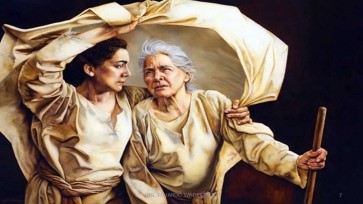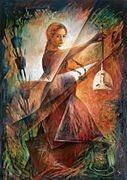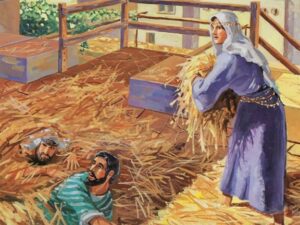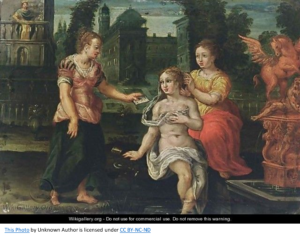There are 5 women in Matthew’s genealogy of Jesus. Women appearing in genealogies is not odd, but it is interesting. There are some fifty women in the genealogies of 1 Chronicles, an intriguing minority among a great swathe of men. It is the same in Matthew, Chapter 1.

Matthew’s genealogy is intended to establish Jesus’ adoptive father Joseph’s claim to descendance from King David, of the Tribe of Judah, from which the Messiah would come.
What are they doing there?
Scholars have two explanations for the women of 1 Chronicles. Either they are descended from ancient families of high standing, or they have assumed roles normally reserved for men. This doesn’t seem to be the case in Matthew’s genealogy.
Mary, Jesus’ mother, is last. She is an obvious choice for inclusion, as the lone human in his conception, i.e Jesus had no biological birth father: “What is conceived in her is from the Holy Spirit,” (Mat.1:20)
The other women are Tamar, Rahab, Ruth and Bathsheba, all ‘foreign’. Tamar and Rahab were Canaanites, Ruth a Moabite and Bathsheba a Hittite, through marriage. (In those times, the head of the household dictated the nation and faith of everyone in it.)

It is possible that these women were chosen by Matthew to demonstrate the inclusivity of God. Jesus, as His mouthpiece, instructed us all to, “make disciples of all nations,” (Mat.28:19).
It seems to me, however, that there is a lot more to Matthew’s choices than that. For one thing, each of these women did something scandalous. Tamar disguised herself to seduce her father-in-law, Rahab was a traitor who harbored Jewish spies, Ruth went brazenly up to the threshing floor to woo Boaz and Bathsheba bathed in full view of King David at night.

Is Matthew saying here that scandalous behaviour can be within God’s purposes and that it would therefore follow that Mary’s unwed pregnancy, not by her fiancé, should also be viewed as God’s purpose?
Jesus certainly proclaimed that substance over form was God’s will. He kept the spirit rather than the letter of Jewish Law.

But, if we look beyond these women’s labels to their ultimate driving force, I think we will see something even more encouraging:
- Tamar was willing to risk her life to obtain justice from her father-in-law.
- Rahab, who was perhaps a sacred prostitute in the Canaanite religion, stood up for a deeper faith she had in the one God of Israel.
- Ruth demonstrated love, loyalty and kindness to her Jewish mother-in-law, as well as believing in her God, the God of Israel: “Your people will be my people and your God my God,” (Ruth 1:16).
- Bathsheba, mentioned only as ‘the wife of Uriah’, ultimately received honor from her son, Solomon, who had a throne placed beside his own so that she might reign at his right hand as queen mother, (1 Ki.2:19).
Could it be that the essences of their stories point to aspects of Mary’s character, the type of woman God chose as mother of his Messiah son? Did Mary seek justice? Was her faith boundless? Was she loving and loyal and kind? Did she ultimately reign as queen mother, at the right hand of her son?
I like to think that was who she was.
What about you? Please comment below or email me.


An interesting analysis!
Thank you.
Dear Bonnie – I’m glad that it got you thinking. God bless, Bobbie